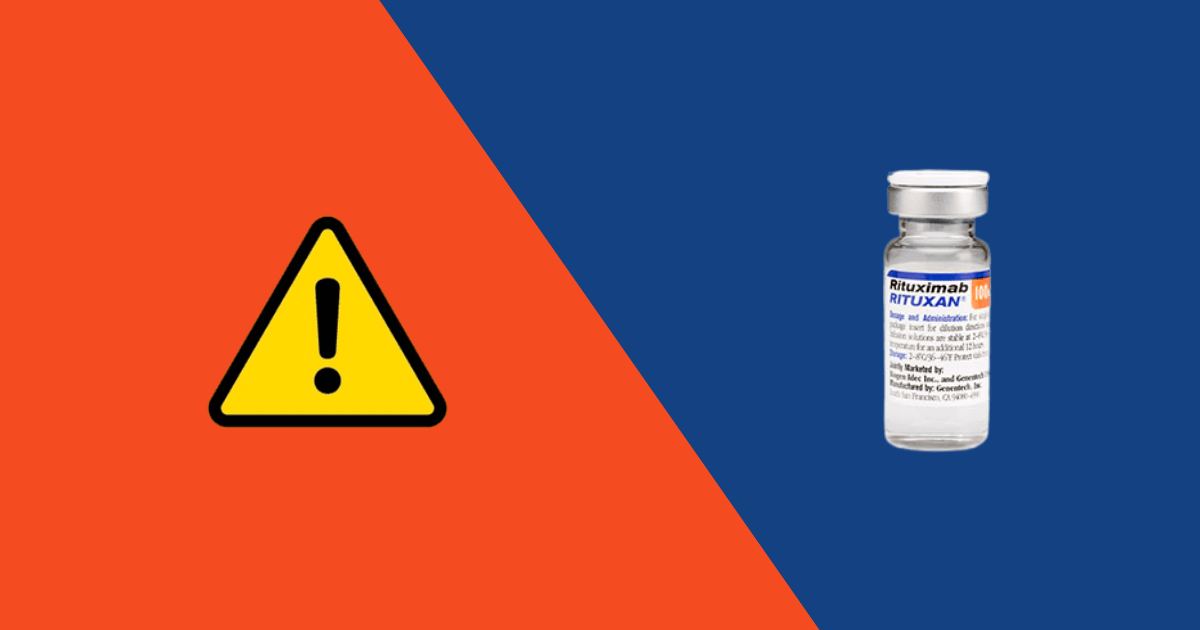Rituxan side effects and how to avoid them
Table of contents
Rituxan is a brand-name medication manufactured by Genentech. It is classified as a monoclonal antibody and is used to treat cancer. While Rituxan is generally well tolerated, there are some potential side effects that people should be aware of. The most common side effects of Rituxan include tiredness and muscle aches. Less common, but more serious side effects, can include kidney and heart problems.
Learn more about the side effects of Rituxan and what you can do to avoid them.
What is Rituxan (rituximab)?
Rituxan is a prescription medication used to treat some types of cancer and autoimmune diseases, including:
- Non-Hodgkin’s lymphoma (NHL), in adults
- Chronic lymphocytic leukemia (CLL), in adults
- Rheumatoid arthritis, in adults
- Granulomatosis with polyangiitis (GPA), in adults and children aged 2 and older
- Microscopic Polyangiitis (MPA), in adults and children aged 2 and older
- Moderate to severe pemphigus vulgaris in adults
If you have cancer that affects your white blood cells or have one of the inflammatory autoimmune diseases above, your doctor may have prescribed Rituxan to you. It is a medication that can reduce the buildup of cancerous and non-cancerous lymphocytes and reduces the amount of inflammation your lymphocyte cells can cause.
Rituxan side effects
The most common possible side effects of Rituxan include:
- Tiredness
- Body aches
- Sore throat
- Fever
- Chills
- Nausea
- Abdominal pain
- Diarrhea
- Muscle spasms
- Temporary low blood pressure
- A fall in red blood cell counts (anemia)
- A fall in white blood cell counts
- An increased risk of infections
- Increased thirst or urination
Rituxan can cause more serious side effects, including:
- Progressive multifocal leukoencephalopathy (PML) – a rare but serious brain infection that can cause severe disability and death in serious cases
- Tumor lysis syndrome – a condition caused by the fast breakdown of tumor cells that can result in kidney damage and failure, and heart rhythm problems
- Heart problems, including chest pain, irregular heartbeats, and heart attacks that can cause lasting damage and can be fatal
- Kidney problems that can reduce kidney function and that can cause fatal kidney failure in severe cases
- Severe allergic reactions to the medication that can cause dizziness, a rapid heartbeat, rashes, itching, and hives, as well as swelling in your face, mouth, and throat that can cause breathing difficulties and shortness of breath
- Stomach and bowel problems that can be fatal in serious cases
- Severe skin reactions including inside your mouth, that can result in peeling, blistering, sores, and ulcers
- Reactivation of the hepatitis B virus if you have previously had a hepatitis B infection
- Increased risk of contracting a serious infections
- Upper respiratory tract infections
If you experience any of these serious side effects, stop taking Rituxan and seek medical attention immediately. You are encouraged to report negative side effects of prescription drugs to the FDA. Visit www.fda.gov/medwatch, or call 1-800-FDA-1088.
What are the long-term side effects of Rituxan?
Long-term side effects of Rituxan may include heart problems, serious kidney problems, serious infections, such as shingles, and reactivation of the hepatitis B virus.
How long do Rituxan side effects last?
Side effects from using Rituxan can occur at any time during and after Rituxan treatment, when the drug is in your system. Side effects could continue for up to 3 years in some cases, depending on the condition you are being treated for.
Rituxan dosage
Rituxan is available as a solution for infusion in the following doses. 100 mg/10 mL and 500 mg/50 mL in single-dose vials.
Rituxan is given to you as an infusion directly into a vein as an intravenous infusion by a doctor or other healthcare professional. Your first infusion will be administered slowly and you will be observed closely while you receive it. Your doctor will prescribe Rituxan to you based on how often you will need infusions and your medical history.
You are advised to read the medication guide provided with this medicine for the drug information and patient information, and always speak with your healthcare provider for medical advice about any changes to your dose so they can monitor and evaluate your condition.
Rituxan drug interactions
Rituxan can interact with other medications including:
- Medication for rheumatoid arthritis, Crohn’s disease, ulcerative colitis or psoriasis – adalimumab, certolizumab, etanercept, golimumab, infliximab, leflunomide, methotrexate, sulfasalazine, tocilizumab, tofacitinib
- chemotherapy drugs – cisplatin
Before taking Rituxan, be sure to tell your doctor about all of the medications you are taking to ensure they are safe to take at the same time.
Rituxan warnings & precautions
Don’t take Rituxan if:
- Are allergic to the active ingredient rituximab
- Are allergic to any of the other ingredients in Rituxan
- Are pregnant or are planning to become pregnant – speak to your doctor about using birth control
Rituxan should not be given to children for conditions other than granulomatosis with polyangiitis (GPA) or microscopic Polyangiitis (MPA). It should also not be given to children under the age of 2 for GPA or MPA.
Talk to your doctor before taking Rituxan if you:
- Are taking any of the medications that could interact with Rituxan
- Have or have ever had any heart problems
- Have any kidney problems
- Have any lung problems
- Have a weakened immune system
- Currently have an infection
- Have or have ever had a serious infection. This includes cytomegalovirus, parvovirus B19, herpes, chickenpox or shingles, or hepatitis A, B, or C
- Have lung disease
- Have recently had a vaccination or are due to have one
- Are breastfeeding or are planning to breastfeed – It is not known if Rituxan passes into breast milk
You should always check with your doctor or pharmacist before taking any medication, including Rituxan, to make sure it is safe for you.
Does Rituxan cause weight gain?
Weight gain may occur with Rituxan, but only in those who took it for Non-Hodgkin’s lymphoma.
What side effects occur with Rituxan during infusion?
Rituxan may cause life-threatening infusion-related reactions and need medical attention right away. Speak to your doctor immediately if you develop symptoms such as fever, shaking, itching, rash, trouble breathing, dizziness, feeling lightheaded, or fainting.
How long does it take to recover using Rituxan?
Rituximab reduces the number of B-cells in your body, helping to reduce inflammation, pain, and joint damage. Your symptoms will improve after around 8 to 16 weeks after you began treatment with Rituxan.
What does Rituxan do to your body?
The active ingredient in Rituxan is called rituximab. It is a type of antibody protein specifically designed to target white blood cells called lymphocytes. Lymphocyte white blood cells are involved in some cancers and are used by your immune system to trigger inflammation. Rituximab attaches to the surface of lymphocyte white blood cells and destroys them.
For cancers like non-Hodgkin’s lymphoma, rituximab can reduce the number of cancerous lymphocytes you have. For chronic lymphocytic leukemia, rituximab can prevent the harmful buildup of lymphocytes. In the case of autoimmune diseases, rituximab can cause a fall in your lymphocyte levels. This reduces the amount of inflammation your lymphocyte white blood cells can trigger.
How does Rituxan make you feel?
The most common side effects of Rituaxn includes fever, muscle aches, headaches, tiredness and chills. These are all signs of infection.
What is the difference between Rituxan and other chemo drugs?
Chemotherapy is a treatment using drugs to kill cancer cells that grow rapidly in your body. Chemotherapy can unfortunately harm healthy cells in your body, causing side effects, such as tiredness. Rituxan is not chemotherapy. Rituxan works by finding and attacking cells where the cancer begins.
What is the procedure for getting Rituxan?
Rituxan is a prescription drug only available when prescribed by your doctor. Rituxan is injected directly into your bloodstream as an intravenous infusion by a healthcare professional.
How to avoid Rituxan side effects
The best way to avoid side effects is to take Rituxan as directed by your doctor. Follow your doctor’s instructions carefully and do not take more or less than prescribed.
If you experience any side effects, talk to your doctor or pharmacist. They may be able to recommend ways to help reduce or prevent some of the side effects.
1. Stick to the recommended dosage
Take your prescribed dose of Rituxan that has been recommended by your healthcare professional. Do not take more or less than prescribed.
2. Monitor your blood sugar levels
If you have diabetes, it is important to monitor your blood sugar levels closely while taking Rituxan. Check your blood sugar levels as directed by your doctor and report any changes to your doctor immediately.
3. Drink plenty of fluids
Drink eight to 10 glasses of water or fluids every day to help prevent dehydration, which can make side effects worse.
4. Avoid alcohol
Alcohol is safe to consume while you are using Rituxan but you are recommended to keep to the recommended guidelines for men and women.
5. Don’t skip meals
Eating regular meals and snacks will help to prevent low blood sugar levels (hypoglycemia).
6. Check your feet
If you have diabetes, check your feet for any cuts, sores, or redness regularly. Tell your doctor if you experience any problems with your feet while taking Rituxan.
7. Know the signs and symptoms of Rituxan side effects
Signs and symptoms of side effects include tiredness and muscle aches. If you experience any of these symptoms speak to your doctor for medical advice.
8. Monitor your weight
Rituxan may cause weight gain or weight loss. If you experience this side effect while taking Rituxan, get medical advice from your doctor.
9. Tell your doctor about all medications you’re taking
Be sure to tell your doctor about all other medications you’re taking, including over-the-counter drugs, vitamins, and herbal supplements, as they can interact with Rituxan.
10. Get regular medical check ups
It is important to get regular medical check ups and monitor your medical conditions. Your doctor will monitor your side effects and may adjust your dose of Rituxan as needed.
Medically reviewed
A medical professional has reviewed this article.


Jamie Winn, PharmD
Jamie Winn, PharmD
Dr. Jamie Winn received his Doctor of Pharmacy in 2002 from the University of South Carolina College of Pharmacy, Columbia, SC. Jamie is a medical reviewer for NiceRx.


